Alumni will go on to successful careers as
- Archivists
- Educators
- Genealogists
- Historians
- Journalists
- Lawyers
- Museum curators
- Policy analysts
- Researchers
- Writers/Authors
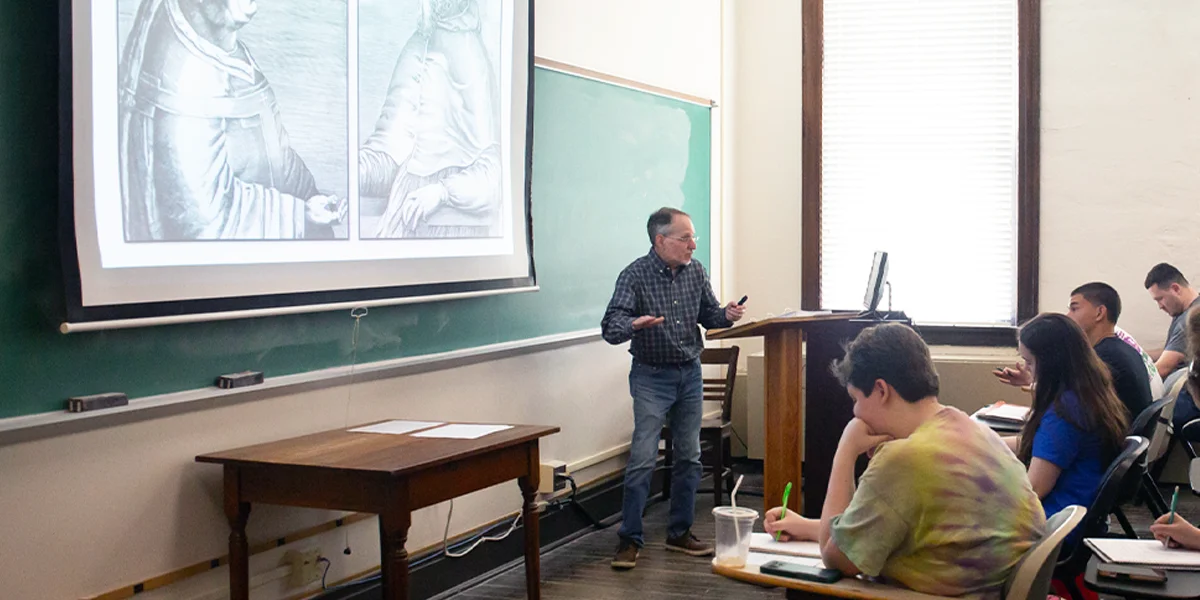
Studying history at Saint Vincent College goes beyond reading textbooks. Students can engage in hands-on learning by making video documentaries, traveling to historic sites, reenacting famous trials, conducting research in archives across America and the world, visiting museums, and creating gallery exhibits. The History Department faculty specializes in American, British, European, Medieval, and world history, offering students a broad and diverse perspective. In the program, students analyze past events, actions, and cultures that have shaped today’s world, gaining valuable insights into historical successes and mistakes. This deepens their understanding of different cultures and global events, helping them make more informed decisions about the future. The flexibility of the history major also allows students to pursue another major or minor that complements their history studies, tailoring their education to their passions.
Public History: The public history major prepares students professionally to work in museums, historical sites, archives, and other public-facing venues.
Social Studies Secondary Education Certification: Students who minor in education gain a deep understanding of historical events, critical analysis, and research methodologies while also developing the skills necessary for effective classroom instruction. Those interested in pursuing secondary education certification can learn more here: Secondary Education Certification: Grades 7-12.
Phone:
800-782-5549
Ext. 2500
Email:
admission@stvincent.edu
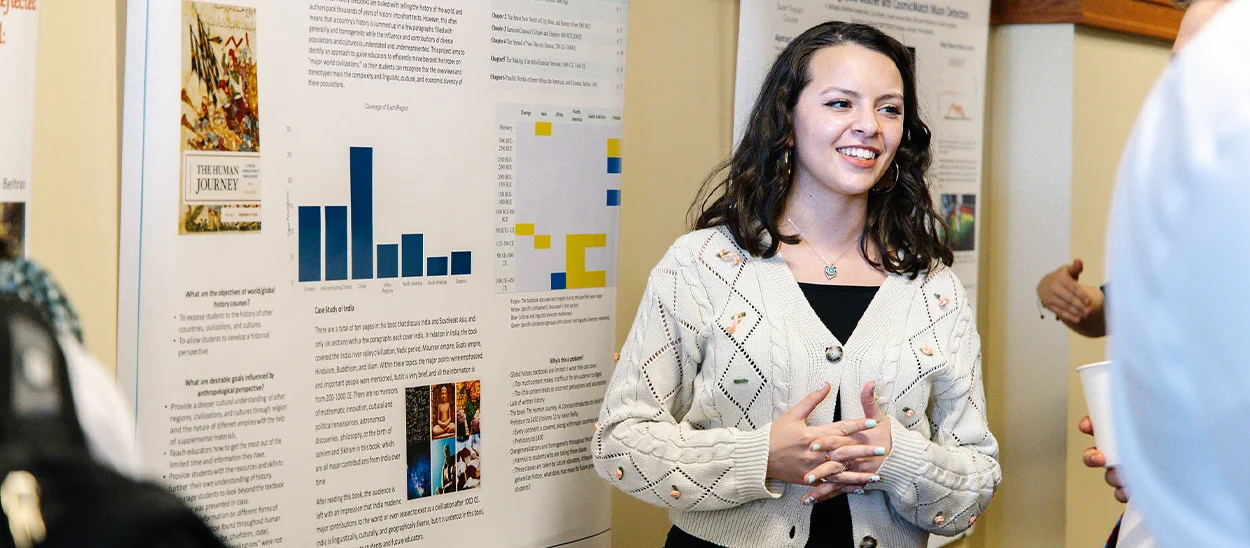
The senior research thesis is a key part of the history program, where students conduct independent research on a specific topic using primary and secondary sources. Guided by a seminar, students apply historical writing skills learned in earlier courses to produce a scholarly thesis. By the end of the fall semester, students complete their thesis and may present it at spring conferences, enhancing their research and analytical skills for future academic or professional pursuits.

History students can take national and international research trips. Often funded by our Andeoli Travel Grants and Palumbo Grants, these trips provide invaluable hands-on learning and a global perspective on history. Our students have explored archives and historic sites in locations such as London, Dublin, Paris, South Africa, Madrid, New York City, Boston, Washington, DC, North Carolina, Florida, Texas, and many more.

Our students gain valuable skills including archival research, exhibit curation, public speaking, and educational programming during internships at places like Fort Ligonier, Blairsville Area Underground Railroad, West Overton Village and Museum, Lincoln Highway Heritage Corridor.

Honoring the legacy of Charles “Chuck” G. Manoli Sr., a beloved emeritus professor of history at Saint Vincent College who inspired students to question authority and the status quo, this free lecture series hosts authors, historians, politicians, and others to present lectures on a variety of topics.
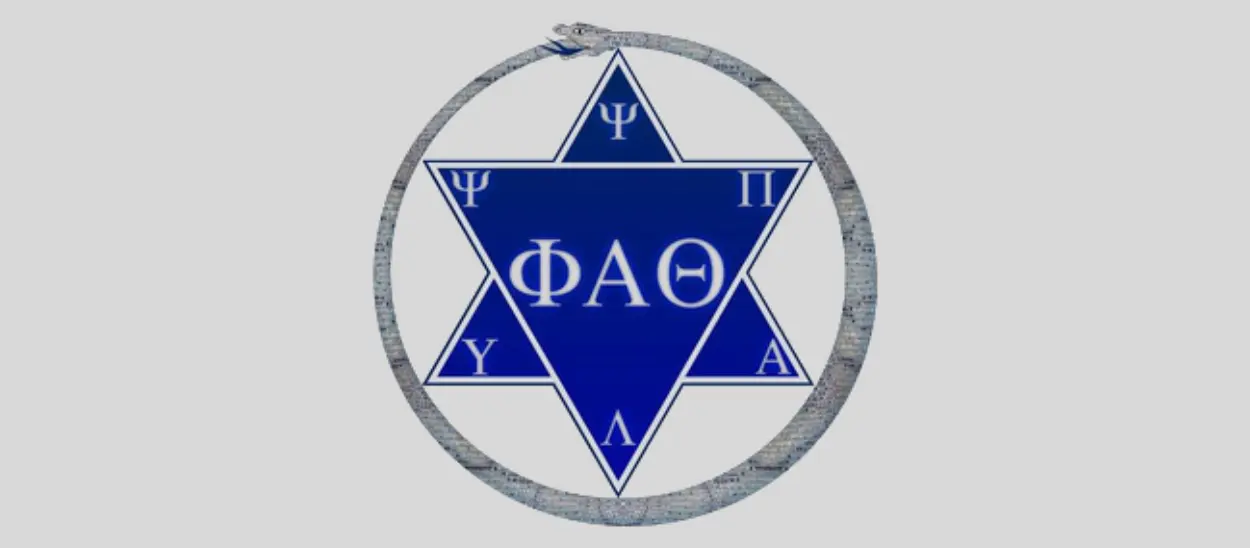
Phi Alpha Theta promotes the study of history through research, good teaching, publication, and the exchange of ideas among historians.
The critical thinking, research, and writing skills gained as a history major are highly valued in many fields. Graduates from Saint Vincent with history degrees have pursued careers in education and academia, cultural and historical institutions, and diverse professional fields.

Alumni will go on to successful careers as
Our students have secured jobs and internships at a variety of companies in their field and enrolled in prestigious graduate schools.


“The education I received with Saint Vincent's history department has shaped my life in so many ways. My professors encouraged my interest in studying abroad in South Africa and enabled research for what would become my senior thesis. Primary source analysis assignments helped prepare me for the in-depth research I undertook, and the exciting in-class discussions and mock trials inspired my teaching pedagogy. I had a wonderful summer internship with the Monastery Run Improvement Project that equipped me with the oral history skills I use in my research and classrooms. And I met some of my best friends in history classrooms!”
Associate Professor of History at Southern Methodist University in Dallas, Texas, and author of To Swim with Crocodiles: Land, Violence, and Belonging in South Africa

“The preparation and nurturing I received from Saint Vincent’s History Department allowed me to enter the teaching profession within a month of graduation; I attribute my success to the higher-level thinking skills, problem-solving, and knowledge that was imparted to me in my four years by highly qualified professors and small class sizes. The history department demands and expects a level of academic rigor and excellence that I now expect of my learners at Greater Latrobe. Furthermore, Dr. Johnson and Dr. Sommers empowered me as a woman to become the leader I am; their help with my senior thesis on the 'Martha P. Falconer and the Segregation of Delinquent Women' was invaluable.”
Social Studies Teacher, Greater Latrobe School District

"The history department taught me how to approach the world with both passion and empathy. As I progressed through my degree, I became deeply committed to the idea that everyone deserves a voice in the historical narrative—a tall task, but one that has continued to guide me in my graduate studies and professional work. I truly wouldn’t be where I am today—serving the Pittsburgh community—without the unwavering support of my professors in the History Department. Their kindness, dedication, and belief in our success shaped not only my academic journey but also my sense of purpose."
University of Pittsburgh, Graduate Student
The history major is part of the School of Arts, Humanities, and Social Sciences and supported by our core curriculum, where students delve into diverse academic subjects at both foundational and advanced levels to explore how different disciplines connect, fostering deeper self-understanding and proficiency in their chosen field of study.
Students have significant flexibility in choosing specific courses to fulfill the history major requirements within our provided structure. All students must take five seminars exclusively for history majors and nine additional courses focusing on specific geographic regions and historical periods. A variety of elective courses are available to cater to diverse interests.
Area Studies – 18 credits
History majors are required to complete three of the following areas at the 100-level:
Upper Division History Classes – 9 credits
History majors must take three courses, or nine credits, from the 200-level offerings.
Majors-only courses – 15 credits
History majors will be required to take
The History major is required to take one course that is designated non-Western. This is not an additional course, but should be fulfilled by careful selection of either area studies or upper-division courses. Courses in this catalog that are designated as non-Western include: HI 123, HI 124, HI 224, HI 232, HI 280, and HI 281. Most non-Western courses will be offered on a two- to four-year rotation, so students should be aware of what is available in any given academic year.
Play Ball: The History of Sport in 20th Century America: This course explores the evolution of sports in 20th century America, focusing on the shift from amateur to professional athletics, the rise of women's participation, and the fitness trends of the last three decades. Students will engage in class discussions based on readings and video documentaries.
The Devil & the Problem of Evil in Western Thought: This course examines the problem of evil in Western thought, focusing on the personification of evil in the devil. It explores the historical emergence of the devil as a being distinct from God in ancient Middle Eastern civilizations. The course covers the devil in the Old and New Testament, his treatment in the West from medieval Christianity to the Renaissance and Reformation, the impact of the Enlightenment on the problem of evil, and modern psychological approaches to evil and possession.
Voices of Medieval Women: This course examines the lives, roles, and achievements of European women from the 5th through the 15th centuries. It aims to understand how medieval women fit into and influenced the patriarchal society of their time. The course focuses on hearing the "medieval female voice" through their writings. Topics include queens and noble ladies, monastic life, female mysticism, urban and rural women, sexuality, marriage and children, scholarship, and the practice of medicine.
The Titanic in History and Culture: For over 100 years, the story of the sinking of the ocean liner Titanic has fascinated and captivated people from around the world. Explore the Titanic's tragic maiden voyage, its cultural impact, and the scientific discoveries following the 1985 wreck discovery. This course delves into the ship's historical and cultural significance, the stories of the 1,496 souls lost and the 712 survivors, and situates the Titanic within the broader history of the early 20th century.






The Center for Northern Appalachian Studies documents the heritage of Northern Appalachia through interdisciplinary study and community projects. It offers students hands-on learning experiences and collaborates with local and international communities to preserve and interpret regional histories.
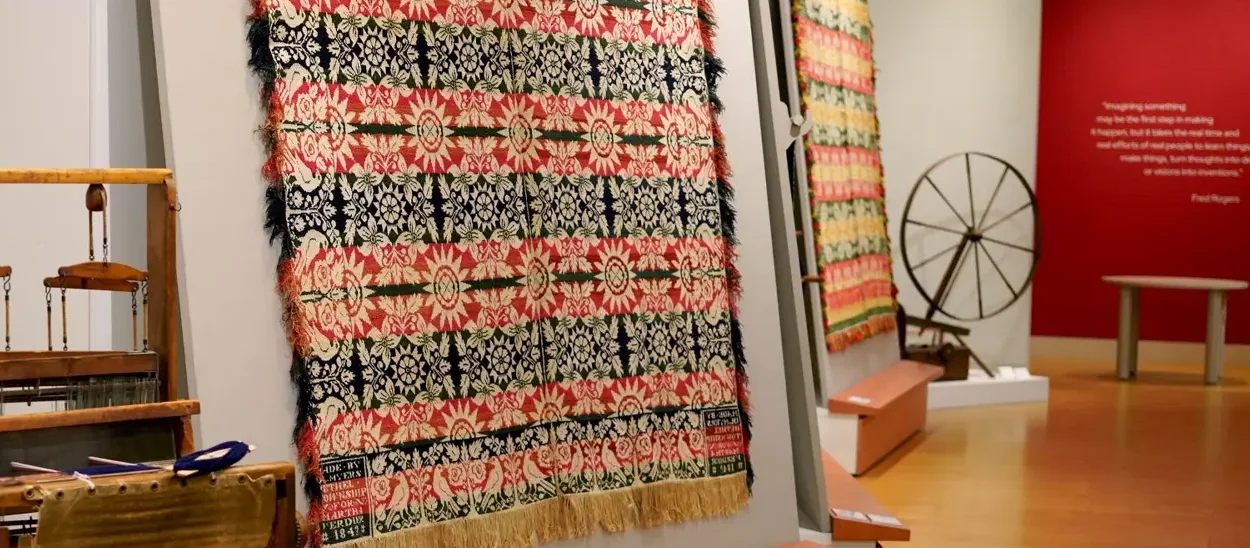
Preserving and interpreting the history of weaving and folk traditions in the Northeastern US, the McCarl Coverlet Gallery offers students hands-on experience through paid work-study positions and internships, and fosters research, exhibits, and educational events centered around its collection of over 300 antique American coverlets.
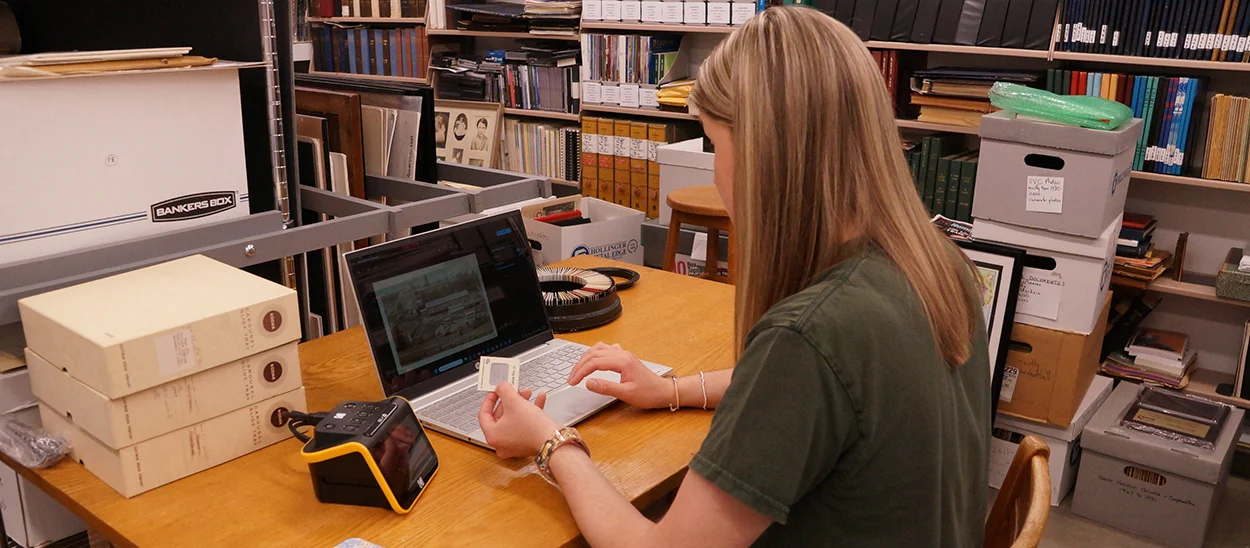
The Archives serve as the repository of artifacts from the college’s long history and as a welcoming host for history interns working with the collections and on exhibits.

The official repository of materials from Mr. Rogers’ life and work housed in the Fred Rogers Institute welcomes history students doing internships on archival collections and management.
Charles G. and Anita L. Manoli Scholarship Fund
The late Charles G. Manoli Sr., Emeritus Professor of History, was a much beloved professor and colleague throughout his 43 years of teaching at Saint Vincent College. He was a graduate of the Saint Vincent Preparatory School (1945) and Saint Vincent College (1951) and his work was recognized by the college with an honorary doctor of humane letters degree in 2005. Mrs. Anita L. Manoli was a treasured Spanish language educator at area high schools and both Charles (Chuck) and Anita were dedicated supporters of higher education in Westmoreland County. They and their family established the Charles G. and Anita L. Manoli Scholarship Fund to continue their support of Saint Vincent College students.
Professor Chuck Manoli’s legacy is carried on through the work of the students who had the privilege of studying with him, many of whom serve on the Manoli Scholarship Committee, which raises funds for this scholarship and works with the College to organize an annual Manoli dinner and lecture.
The Manoli scholarship is awarded each year to a history major identified by history department faculty. The scholarship is renewable for up to four years, contingent on the awardees’ continued merit and satisfactory progress in their history major. Awardees are recognized at the annual Manoli Scholarship Event.
Phone:
800-782-5549
Ext. 2500
Email:
admission@stvincent.edu